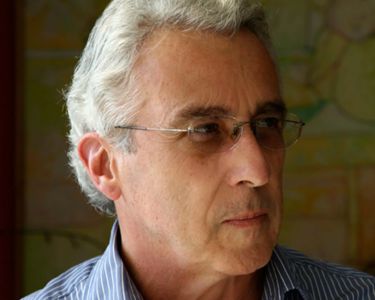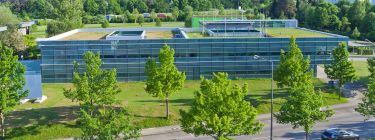
A Program for Culture at the Crossroads
Prof. Dr. Miachael Resch, Director of HLRS High-Performance Computing Center, Stuttgart; Prof. Dr. José Teixeira Coelho Netto, Curator at Media Solution Center, Baden-Württemberg; Matthias Hauser, General Manager at Media Solution Center, Stuttgart
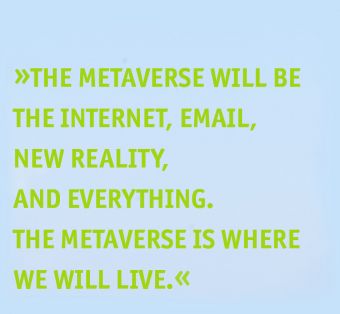
A Program for Culture at the Crossroads
Mission accomplished?
The world is about to enter the Metaverse, says Mark Zuckerberg. The Metaverse, in his vision—or in his eagerness for more power and wealth disguised as a noble contribution to humanity—is a virtual place where we work, have fun, meet friends, watch movies, play games, and, most of all, consume. The Metaverse will be the internet, email, new reality, and everything. The Metaverse is where we will live. Monika Bickert, Metaverse’s vice-president in charge of policy content, wrote an article for Le Monde on November 10, 2021, in which she stressed that the Metaverse is a new kind of life.Facebook, Mark Zuckerberg’s previous company name that he is now trying to sweep under the rug, claims to have 2.9 billion users in 2021. It may be so. If it is, the foundations for Zuckerberg’s Metaverse have already been laid—in a very short time, considering Facebook’s founding in 2004. The Metaverse is not here yet, but Facebook is—and Facebook is the dress rehearsal for the Metaverse.
Picture above: High-Performance Computing Center HLRS University of Stuttgart, Copyright: Boris Lehner for HLRS
Picture left:
The impending Metaverse—as the successor of Facebook in a family that houses its siblings Twitter, Instagram and TikTok—is not an index of a recent crisis: it configures a dynamic that has been going on for quite some time now. However, this crisis—or moment of decision, in its etymological meaning—has become acute in the last couple of years. Everywhere voices are warning that either we do something now or humanity may lose its grip on its destiny. The remarkable novel The Machine Stops1, published by E.M.Forster in 1909, was at the time considered to be just a piece of futuristic divertissement. But its depiction of a proto-Metaverse shows all the characteristics Mark Zuckerberg boasts about his project. Forster’s book was a fantastic effort to anticipate a reality in which humanity has been increasingly living since then, with some dramatic peaks in the last couple of years—one of them being the attempt to invade the Capitol on January 6, 2021, to keep Donald Trump in power. Even our contemporary social media is described in 1909 as the „behavior modification empire“.This description is a rather generic, mild, and euphemistic label and could equally apply to the movie industry, the television industry, and much more. Therefore, we prefer to name it more straightforwardly: antisocial media.
As the computer scientist Jaron Lanier, author of Ten Arguments for
Deleting Your Social Media Accounts Right Now (2018), argued, social media is a challenge to humanity just as serious as the greenhouse effect. So, it is appropriate to say that media are responsible for the “greenhouse effect of the mind” based to a large extent on artificial intelligence and its supporting algorithms.
We could better understand the new developments by looking at ourselves, our perceptions, and our ideas about the world around us. The French philosopher and sinologist Francois Jullien has compared Chinese and European views of the world2 (The Propensity of Things: Toward a History of Efficacy in China, 1999). He concludes that our European view of the world is shaped by our looking for an ideal (eidos), aiming at modelling the world such that we can achieve that ideal. As a consequence, we tend to think in models. It seems to be obvious that thinking in models has led us to describe the world in mathematical terms. This method was feasible as long as that description did not spin out of control. With the advent of the computer, our mathematical description of the world has become the dominant (for some the only) and most efficient description of the world. Artificial Intelligence now aims to turn a de-scription into a pre-scription to use our mathematical models to control our world better.
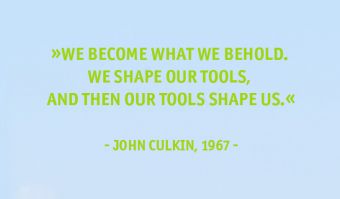
Several human hopes and desires are driving this prescription. Mathematical models avoid ambiguity by helping us to identify specific solutions in an ambiguous world. We can further claim that our solutions are not distorted by human intervention, with mathematical algorithms executed by a flawless machine—only experts understand that computers are neither flawless nor do they operate without human intervention. The idea of excluding human error allows us to pretend that our digitally created realities based on mathematical models are just—devoid of any prejudice and human flaws. In addition to this idea of an artificially created intelligence, the vision of creating life without resorting to nature is tempting, especially if we believe that this is a species created only from human minds and exempt from all the flaws that come with the dirty and mortal nature that surrounds us.
Our enthusiasm for our creations leads us to ignore the warning issued by John Culkin in 1967: „We become what we behold. We shape our tools, and then our tools shape us.“ Taking the models we create for reality has always been the danger of our model-based approach
to the world. Unfortunately, with the computing power in our most current systems, these models get a life of their own and start to spin out of control. This fact itself is a reason to reflect on our understanding of the digital world. Nevertheless, we see disturbing developments that point to human beings‘ abuse of digital technologies beyond that.
After all, Jaron Lanier may have pushed too hard when he called people to delete their „antisocial“ media accounts. He should have stopped short of throwing away the baby with the bathwater. Were it not for the digital tools, to mention one specific event—the ongoing Covid 19 pandemic—the disaster might have been even more extensive. However, his warning is most welcome.
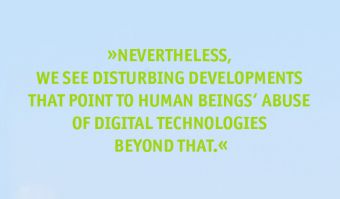
A Program to Address the Situation
If there is still time to remedy this situation, the solution lies in the complete understanding of the meaning of the term “antisocial media” and, in a broader sense, of eCulture. „Understand in order to control,” warned Ludvig Wittgenstein. Humanity must understand eCulture, or eCulture will completely control humanity. Of course, that has always been the issue with every new technology, be it the horseless vehicle, photography, movies, radio, or television. However, none of these innovations compares with the overwhelming power and ubiquitous presence of the antisocial media and artificial intelligence, which have been developing in eCulture—probably the final cultural utopia. Of course, a utopia may be a dystopia or a utopia—that is up to humanity to decide. In order to contribute to the effort towards a utopian eCulture, the Media Solution Center (MSC) has developed the „Reach“ project aiming to promote the understanding of eCulture in as many fields as possible—in the arts, culture, economy, social behaviour—and to create the conditions for eCulture to become a fundamental tool to the advancement of knowledge in a way that promotes civilisation. eCulture has the potential to achieve this goal if humanity can control it. This would be a renaissance.
MSC’s major all-encompassing step is the promotion of the necessary merging between the Humanities (understood as a general umbrella term covering philosophy, the arts, and the disciplines that study the different aspects of human society and its culture) and the Sciences. We have been talking about interdisciplinarity at least since the mid-20th century. Now it is not a question of opting for interdisciplinarity anymore: it has become imperative. A single initiative will not solve a crisis like the one we have experienced in the last couple of years.
If it has been possible for humanity to get an image of the M87* black hole fifty-three million light-years away from Earth, it is because eight observatories scattered all over the Earth convened to transform themselves into one vast and integrated telescope the size of this planet.3 It will take an effort of the same magnitude, probably even more extensive, to confront the Metaverse.
The 21st century saw the emergence of a generation native to eCulture, compared to the older generations for whom it was a novelty. The aggregate power of this new generation provides a unique tool in the forging of a new age for humanity. The MSC wants to be an active part in the effort to avoid a situation in which the limitations of artificial intelligence and its algorithms become the limits of humanity.
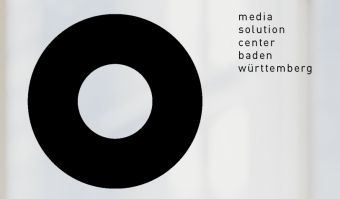
MSC has therefore structured its Reach Project as the Research and Creation Center for eCulture and the Humanities. The Center intends to develop a program building a bridge over the ever-growing gap between the Humanities and science and technology. This distancing between the two fields has become widely addressed since the beginning of the 20th century—the conflict between the „two cultures” C.P. Snow described in his 1959 eponymous book.4
Picture left: Logo Media Solution Center Baden-Württemberg
Mission One: Converging Humanities and Science
MSC’s Reach project’s first mission is to support and amplify the conversation between the Humanities and the „hard“ sciences. The Reach Project will not directly address science and digital technology. It will also investigate eCulture as the medium to which science, digital technology, and the Humanities converge to create a distinctive culture, a culture that can face the Metaverse. MSC’s principal arm for that is its academic, nonprofit research program dedicated to today’s culture’s complex and multidisciplinary study. This program includes contributions from the most diversified areas, including physics, neurosciences, biology, the study of social systems, and other complex approaches to the way we are living today surrounded by the internet and all forms of virtual representations. This program will consist of lectures, colloquia, seminars, and short duration courses oriented by the just-in-time principle, as opposed to the just-in-case principle.
Mission Two: CreativeLab
Reach’s second mission—where MSC leaves the academic field to tackle the thing itself—is to support young professionals in their projects leading to the creation of start-ups involved in using the current cutting-edge technology, especially artificial intelligence. This support will come through Reach’s CreativeLab, which will host collectives organised around professional projects requiring cutting-edge studies and all the material and economic support they may need, either in campus residencies or virtually. Creativity plus an understanding of what is going on is the underpinning of the CreativeLab.
Mission Three: Observatory of eCulture
Reach’s third mission is creating an Observatory of eCulture that will gather information about all things related to eCulture, from the internet to robotics to the social impacts of digital technology. Data—especially Big Data—have already been identified as the new source of wealth and power. However, there is barely any research by any creative initiative that does not depend on a well-organized information centre resulting from constant, attentive, and active observation of the world. Therefore, identifying, storing, and analysing the gathered information has become necessary.Reach’s three missions are enabled by the Network the MSC is part of: The HLRS, the High-Performance Computing Center with its supercomputer, the HdM Stuttgart Media University, with its highly specialised faculties, and the Core-Partner ZKM, Center of Art and Media Karlsruhe. These are unique assets not found elsewhere. As a result, MSC has the concept, the material means, and the people to concisely drive this project into reality. And it will—and it will thus be a focal point for this Renaissance in the Making.
Where: at the High-Performance Computing Center HLRS University of Stuttgart, directed by Prof. Dr. Michael Resch, and the Media Solution Center MSC, directed by Matthias Hauser. Duration: as long as it takes.
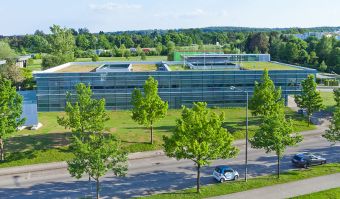
Picture above: High-Performance Computing Center HLRS University of Stuttgart, Copyright: Boris Lehner for HLRS
References
1 E.M. Foster, The machine stops, Penguin Classics, 2011
2 Francois Jullien, The Propensity of Things: Toward a History of Efficacy in China, Merve, 1999
3 The Astrophysical Journal 901:67, September 20, 2020
4 C.P. Snow, The Two Cultures, 1959.
Matthias Hauser
Matthias Hauser has had extensive experience managing the dialogue between Art and Technology. He received a formal education in music. During his professional career as a musician, Matthias Hauser understood that art is a comprehensive system with specific artistic languages in dialogue. His experience in Art Education as a professor of violoncello acquainted him with introducing people to art – which is the base of his arts management practice.As director of an art gallery in La Coruña and Stuttgart for fifteen years, Matthias developed special projects involving art and cutting edge technology for Brands such as Rolls Royce during the 31 edition of Sao Paulo’s Biennial, Gallery Weekend Berlin, and Multimedia Art Dialogues at the Main Palais, Frankfurt. In 2019 Matthias was appointed as the first director of the Media Solution Center in Stuttgart (MSC) – an extension of the High Computing Center (HLRS) at the University of Stuttgart. The MSC bridges between HLRS’s computing capacity — one of the largest high-performance computers– and the needs of industries, corporations, research centers, art institutions, and social organizations in computing resources. Matthias Hauser will face the challenge of creating the conditions for individuals, collectives, and institutions to realize their goals.
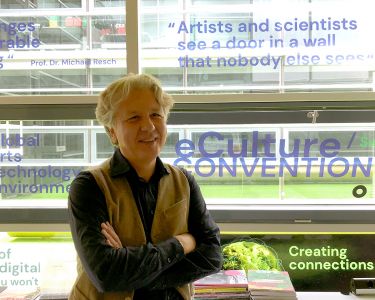
Prof. Dr. Michael Resch
Prof. Michael Resch is the director of the German National Supercomputing Center HLRS and the director of the Institute for High Performance Computing at the University of Stuttgart He is a member of the board of trustees of the Center for Art and Media Karlsruhe (ZKM) and an advisory member of the board of trustees of the German Schiller Association. He is a member of the University Council of the University of Stuttgart and a member of the consulting committee of the Film Akademie Ludwigsburg. He was a Co-founder of the Media Solution Center in 2018 and a Co-founder of the Automotive Solution Center Stuttgart in 2008. Prof. Resch was awarded an honorary professorship in 2014 and an honorary doctoral degree in 2011 by the Russian Academy of Science and an honorary doctoral degree in 2009 by the Donezk National Technical University. Michael Resch is a PI since 2007 in the German clusters of excellence for “Simulation Technology” (2007 – 2018) and “Data-Integrated Simulation Technology” (2019 – 2025) as part of the German Initiative for Excellence in Research. Michael Resch holds a Dipl.-Ing. (MSc) in Technical Mathematics (Technical University of Graz/Austria) and a PhD in Engineering from the University of Stuttgart.
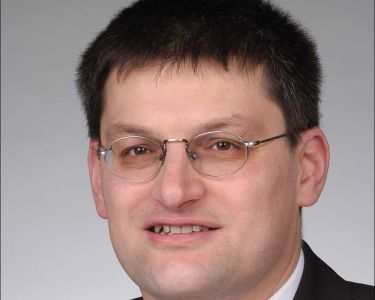
Prof. Dr. José Teixeira Coelho Netto
Dr. Teixeira Coelho is the coordinator of a research group on Computational Cultures and Humanities at the Institute of Advanced Studies of the University of São Paulo, from which he received in 2015 the honorific title of Professor Emeritus for his accomplishments in research, teaching and extension services to the community. He was the director of the Museum of Contemporary Art of São Paulo, which has the most important collection of modern art in Brazil, and the chief curator of Masp – São Paulo Art Museum, a major institution of art in the South Hemisphere. Formerly professor at the Institute of Architecture of University Mackenzie in São Paulo, he has been invited for a number of universities around the world and was granted fellowships from the Fulbright Foundation, Rockefeller Foundation, Japan Foundation and the São Paulo Foundation for the Support of Science, among others. He has published a large number of books on art, culture and cultural policy, among them eCulture, The Final Utopia (2020) and Signs and Wonders (in the Digital Age), 2021. He was also awarded a Portugal Telecom Prize for Literature in Portuguese for his novel História Natural da Ditadura. Since 2020, he has held the position of curator at the MSC.
